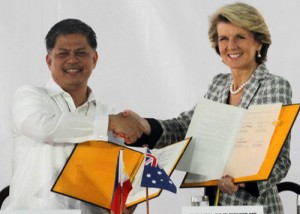THE Australian government set aside A$150 million (P6 billion) to support a six-year high-impact education program for the Philippines, Australian Foreign Minister Julie Bishop announced on Friday.
Bishop made the announcement during the signing of the memorandum of subsidiary arrangement for the Basic Education Sector Transformation (BEST) program, the new Australian-Philippine education initiative.
The new program, she said, is a continuation of the 50-year education partnership between the Australia and the Philippines. Australia is the largest bilateral grant donor to the Philippines in education.
“Australia and the Philippines are good friends and neighbors. The BEST program is a continuation of our commitment to partner with the Philippines to promote prosperity, reduce poverty and enhance stability,” Bishop said during the launch rites at the Neptali Gonzales High School in Mandaluyong City.
Bishop said the new program will affect more than 8 million Filipino children.
“We believe that giving opportunity to Filipino children is the priority of the Philippine government and Australian government,” she said.
Bishop noted that investing in education is essential to ensuring a skilled and competitive workforce, capable of boosting labor productivity and furthering economic growth.
Education Secretary Armin Luistro expressed his gratitude to the Australian government for helping the education sector implement projects across the country.
“We at DepEd [Department of Education] express our heartfelt thanks to the Australian government, especially Prime Minister Bishop. Australia is our best partner in reforming Philippine education. The education department and Australian Agency for International Development [AusAID] have been partners in pushing the educational agenda for 15 years. This new partnership signifies the commitment of both parties to attain quality education for Filipino learners,” Luistro said.
“With the implementation of the K-to-12 [Kindergarten to Grade 12] program, I am so certain that the friendship of Australia and the Philippines will continue beyond our term,” he added.
BEST is a six-year program that aims to assist the Philippines in improving learning quality and access to education in the context of the K-to-12 program.
The program would improve teaching and learning quality and access to education as well as to strengthen systems. It would also aid to boost a unified management and information system, enhance education leadership and management, and promote gender sensitive education, and advance curriculum, assessment and materials.
“Through BEST, there will be additional 1,000 classrooms, 40 science and computer laboratories, and two Indigenous Peoples’ Learning Centers for our learners,” Luistro said.
Too, scholarships and trainings for teachers would be provided. A technology and research center focusing on Assessment, Curriculum and ICT in education would be established through this program. It would also aid in strengthening DepEd’s capacity for disaster preparedness.
It will be implemented at the national level but focus in six regions initially—the National Capital Region, Bicol Region, Northern Mindanao, Western Visayas, and Estaern Visayas. The last three regions were affected by the Bohol earthquake and typhoon Yolanda.
The K-to-12 reform supported by BEST program will also play a role in influencing changes in tertiary curricula that will allow Philippine universities to be internationally competitive in attracting students from Australia under the New Colombo Plan, a signature initiative of the new Australian government that will commence in the Philippines by 2015.
If the BEST program is successfully implemented, more children will be able to demonstrate improved mastery of the basic education curriculum competencies, especially in English, mathematics and science.



